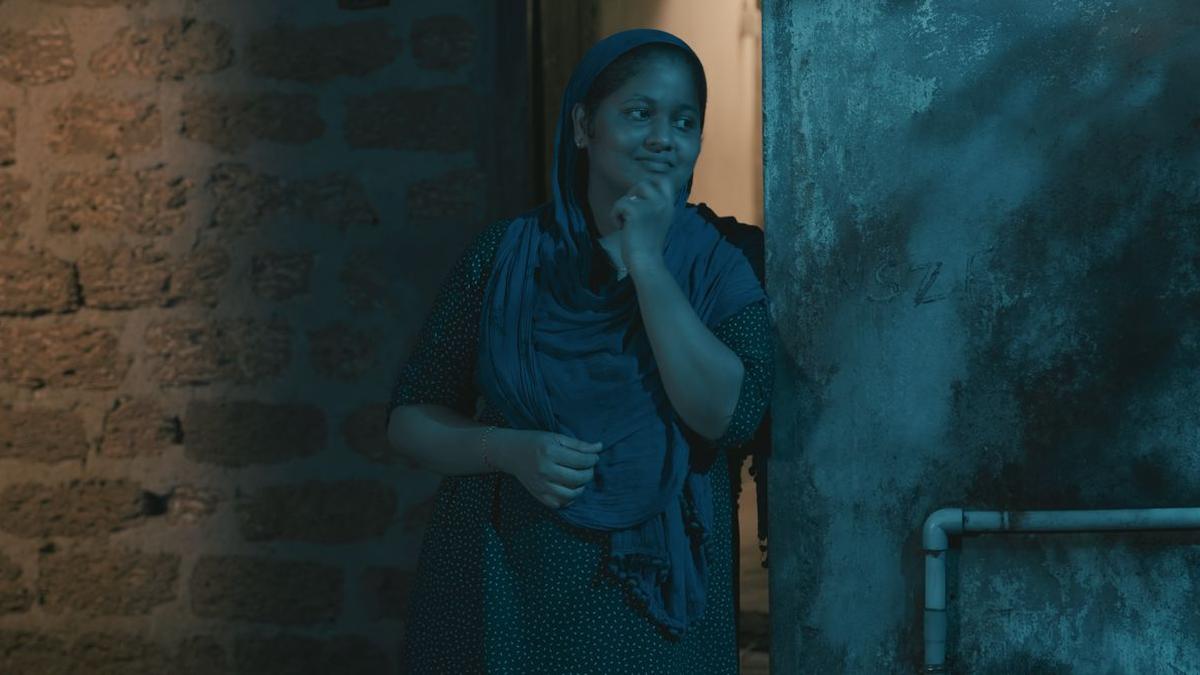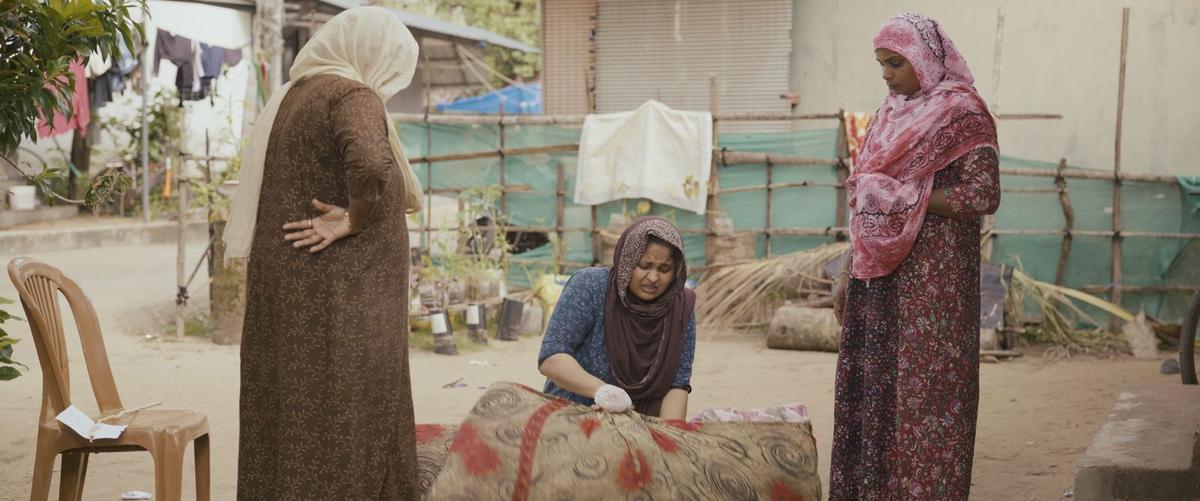Feminist Fathima is Fasil Muhammed’s directorial debut, a profound, satirical take on patriarchal control and religious fundamentalism. This film premiered at the 29th International Film Festival of Kerala (IFFK), under the International Competition category. It went on to win five awards at the festival, including the jury prize and the audience poll award. Because of its rich, multi-layered narrative and profound themes, this film calls for a detailed analysis.
Feminist Fathima: the heart of the story
Set in the coastal town of Ponnani, Kerala, the story of Feminist Fathima revolves around Fathima, a housewife navigating life in a deeply orthodox household. Her husband, Ashraf (Kumar Sunil), is the revered village Ustad, held in high regard by their community. Fathima’s mother-in-law is conservative, who believes, for instance, that women should have no say in matters concerning the family and should “just obey” their men. In this backdrop, Fathima aspires to live a dignified life, one in which her boundaries and aspirations are respected.
Set in the coastal town of Ponnani, Kerala, the story of Feminist Fathima revolves around Fathima, a housewife navigating life in a deeply orthodox household.
The story begins with a rather mundane incident. One night, her youngest son wets the mattress they all share. As usual, Fathima takes it upon herself to wash the mattress, while also attending to her endless household chores. She puts it out to dry, but a stray dog urinates on it when she’s away. When Ashraf becomes aware of this, he refuses to let her bring the “defiled” mattress into the house.
Fathima must now sleep without a mattress. But, this doesn’t concern Ashraf, as he believes that Fathima is capable of managing this “minor inconvenience” on her own. Amidst a worsening backache and an increasingly demanding household, Fathima faces an unexpected challenge: buying a mattress for herself.
Fathima’s struggles become our own
Fathima is brought to life in a way that is deeply compelling, thanks to an exceptional character sketch and an amazing performance by Shamla Hamza. We sympathise with her—her journey feels so real that we find ourselves rooting for her every step of her journey.
What makes Fathima’s character so effortlessly relatable is how she embodies the everyday struggles and quiet victories of women we’ve all known and seen in our own lives. She represents the countless women facing systemic challenges, yet finding small moments of triumph. Fathima’s win, both literal and symbolic, fills us with a sense of hope and resilience, reminding us that change, no matter how difficult, is always possible.
The mattress serves as a powerful metaphor for Fathima’s struggles and her eventual redemption.
The mattress serves as a powerful metaphor for Fathima’s struggles and her eventual redemption. Her journey begins with the sight of a defiled mattress, mirroring the weight of the burdens she carries, and the story concludes with her purchasing a brand-new mattress—symbolising her transformation. At the start, Fathima is seen “carrying” the mattress, trying to salvage it, symbolic of how women often carry the burden of societal expectations at the expense of their own freedom. But as the story unfolds, the mattress evolves into a symbol of her awakening. The realisation that she needs to free herself from this burden marks a turning point in her character’s arc and mirrors her evolution into a woman who embraces her agency and independence, a true feminist.
Ashraf’s fall from grace in Feminist Fathima
This brings us to Ashraf, Fathima’s husband, brilliantly portrayed by Kumar Sunil. Ashraf is the archetypal religious fundamentalist—deeply superstitious and unwaveringly firm in his beliefs. He adheres strictly to every rule prescribed by his religion and imposes it on others as well, especially, his family. He forbids Fathima from borrowing money with interest, calling it ‘haram,’ and similarly prohibits her from using someone else’s mattress for the same reason. For Ashraf, religious diktats consistently outweigh rationality and individual autonomy.
What makes Ashraf’s character arc compelling is the transformation he undergoes. The strict, authoritarian figure that he is, at the beginning of the film—wielding patriarchal control over his family and commanding respect in the community—gradually fades into nothingness. As Fathima’s individual agency grows, both within her household and outside of it, Ashraf’s power diminishes. Towards the end, he is reduced to a figure of ridicule, a man unable to keep up with the changing dynamics around him.
This character arc is a masterful depiction of how men who cling to oppressive systems and refuse to accommodate the evolving demands for women’s autonomy and agency risk becoming inconsequential. Sooner than later, they will fade into irrelevance, reduced to little more than laughing stocks.
Ashraf’s crisis unfolds in a changing world
When Ashraf gradually loses control over Fathima, a deep sense of unease is created within him. For years, he has enjoyed the privileges of being the patriarch of the household, using this position to keep Fathima under his thumb. But as Fathima begins to assert her agency, the power dynamic shifts, leaving Ashraf increasingly unsettled.
He notices their neighbor’s daughter, also from their faith, posting videos of herself dancing on social media—an act he considers “forbidden” by their religion.
This transformation takes place in the backdrop of a swiftly changing world. He notices their neighbor’s daughter, also from their faith, posting videos of herself dancing on social media—an act he considers “forbidden” by their religion. He is taken aback when he sees a learned woman, again from his own faith, confidently leading a land survey—something he never thought the men of his faith would ever allow and accept. These elements reveal a society in transition, where women are breaking free of patriarchal constraints and forging their own paths, leaving behind men like Ashraf who refuse to change.
Ashraf’s struggle is not just personal but symbolic of a larger “crisis”. His anxiety reflects the collective insecurity many men face worldwide as women drive conversations about their fundamental rights and autonomy. In this rapidly changing world, those unwilling to adapt are being left behind, grappling with their diminishing relevance in society.
Fathima’s path to financial independence
One of the most compelling themes discussed in the film is Fathima’s journey towards achieving financial independence and how it parallels her struggle to reclaim her autonomy. Midway in the film, she realises that relying financially on her husband is what is keeping her trapped in this orthodox household. Her growing awareness pushes her to take charge of her own life, starting with something as seemingly simple, yet symbolic, as buying a new mattress—a need her husband shows no intention whatsoever of fulfilling.
Determined to provide for herself, Fathima begins working for her neighbor, earning her first income. With this money, she opens a chit—a community savings scheme. She reaches out to the women in her village, persuading them to join and invest in her chit. Her hard work pays off when she finally saves enough money to buy her own mattress, a physical manifestation of her newfound agency.
The film’s emphasis on financial independence is both profound and urgent, particularly for marginalised women who often endure oppressive systems due to a lack of economic opportunities.
The film’s emphasis on financial independence is both profound and urgent, particularly for marginalised women who often endure oppressive systems due to a lack of economic opportunities. Fathima’s story highlights financial self-reliance, not just in changing personal circumstances but in challenging the structures that perpetuate inequality and subjugation.
Wit against authority in Feminist Fathima
Feminist Fathima’s most remarkable achievement is its masterful use of humor to critique religious fundamentalism and male supremacy. Through sharp satire, the film exposes the absurdities of rigid traditions, superstitions, and patriarchal norms, reinforcing its message with wit and precision.
Particularly striking is its critique of religious fundamentalism and the irrational beliefs that accompany it. In one scene, Ashraf declares that placing a religious scripture near the drying mattress will prevent dogs from urinating on it—only for a dog to immediately prove him wrong. In another scene, as he prepares to leave home, a coconut falls at his feet, and he considers it as an ominous sign and goes back inside, only for another coconut to fall immediately, highlighting the randomness of such events and the futile exercise of assigning them deeper meaning.
The film also uses humor brilliantly to dismantle the authoritarian nature of male supremacy. Ashraf’s laziness and sense of entitlement are depicted hilariously—he won’t even get up to turn on the fan, expecting Fathima to do it for him no matter how overwhelmed she is with household chores. However, as Fathima’s agency grows, this dynamic begins to change. The small privileges that Ashraf once took for granted, like Fathima fetching his towel or turning on the fan, are stripped away one by one.
In a pivotal scene, Ashraf calls for Fathima to bring him a towel as he’s leaving the house—a task she dutifully performed earlier in the film. This time, however, she throws the towel at him from inside the house without even bothering to step outside. I still vividly remember how the entire theatre roared with laughter and applause at this scene.
Through humor, the film exposes the male supremacist structure for what it truly is: a joke!
Through humor, the film exposes the male supremacist structure for what it truly is: a joke! This film serves as a reminder that humour and satire can be the most effective forms of challenging authority and dismantling rigid systems. As Mark Twain once wrote, ‘Against the assault of laughter, nothing can stand.‘
Feminist Fathima provides a timely critique of religious fundamentalism and power structures based on male supremacy, which are on the rise globally. The film serves as an excellent example of how to critically discuss issues within organised religion without falling into the trap of being labeled as “phobic.”
About the author(s)
Adithya (he/him/his) is a political consultant specializing in research and communications, currently on a ‘strategic sabbatical’ to pursue his passion for writing. Beyond engaging in political debates, he is drawn to reading and film, especially works that challenge the status quo. He has a particular affinity for works on feminism, geopolitics, and history.










